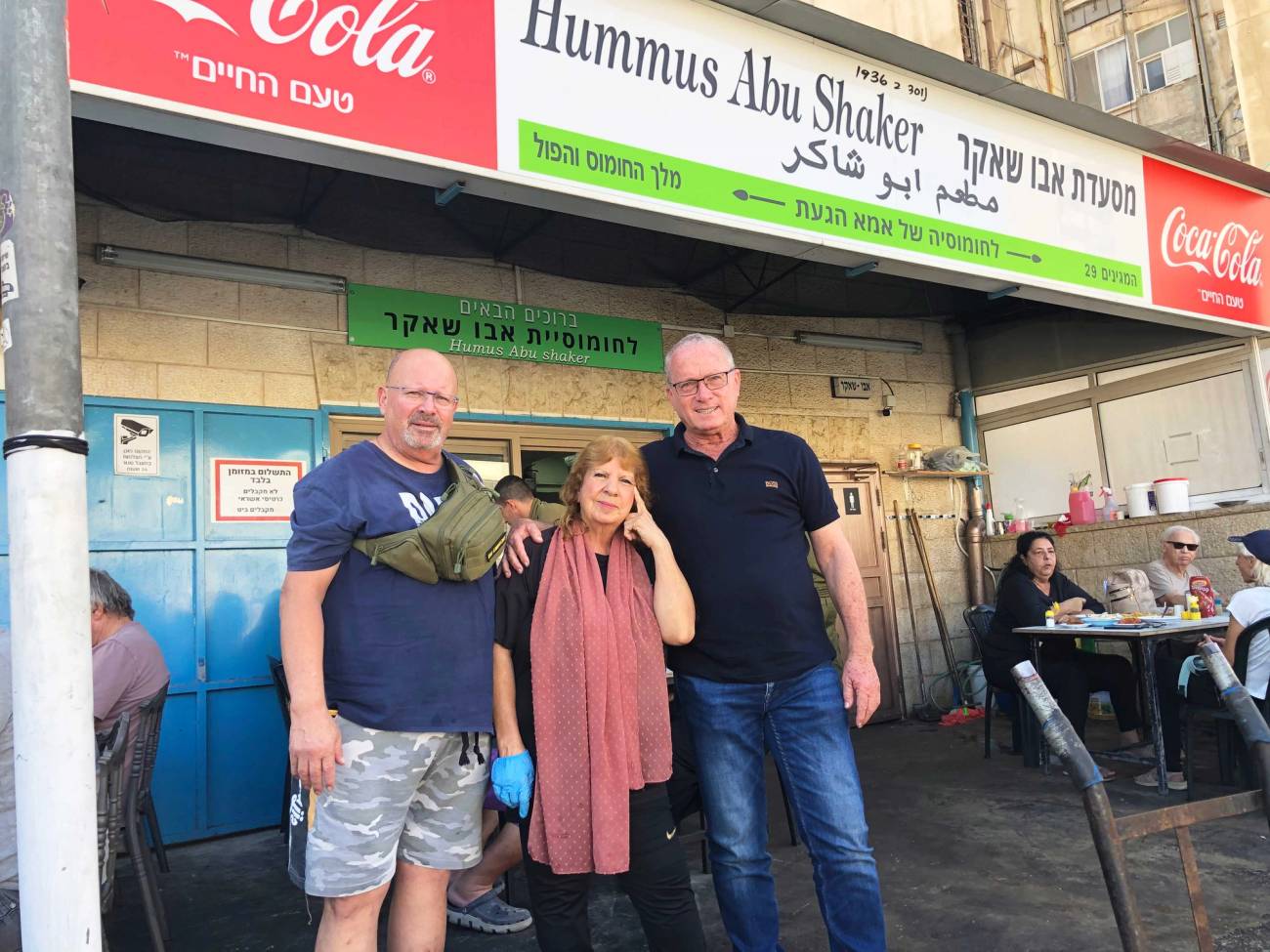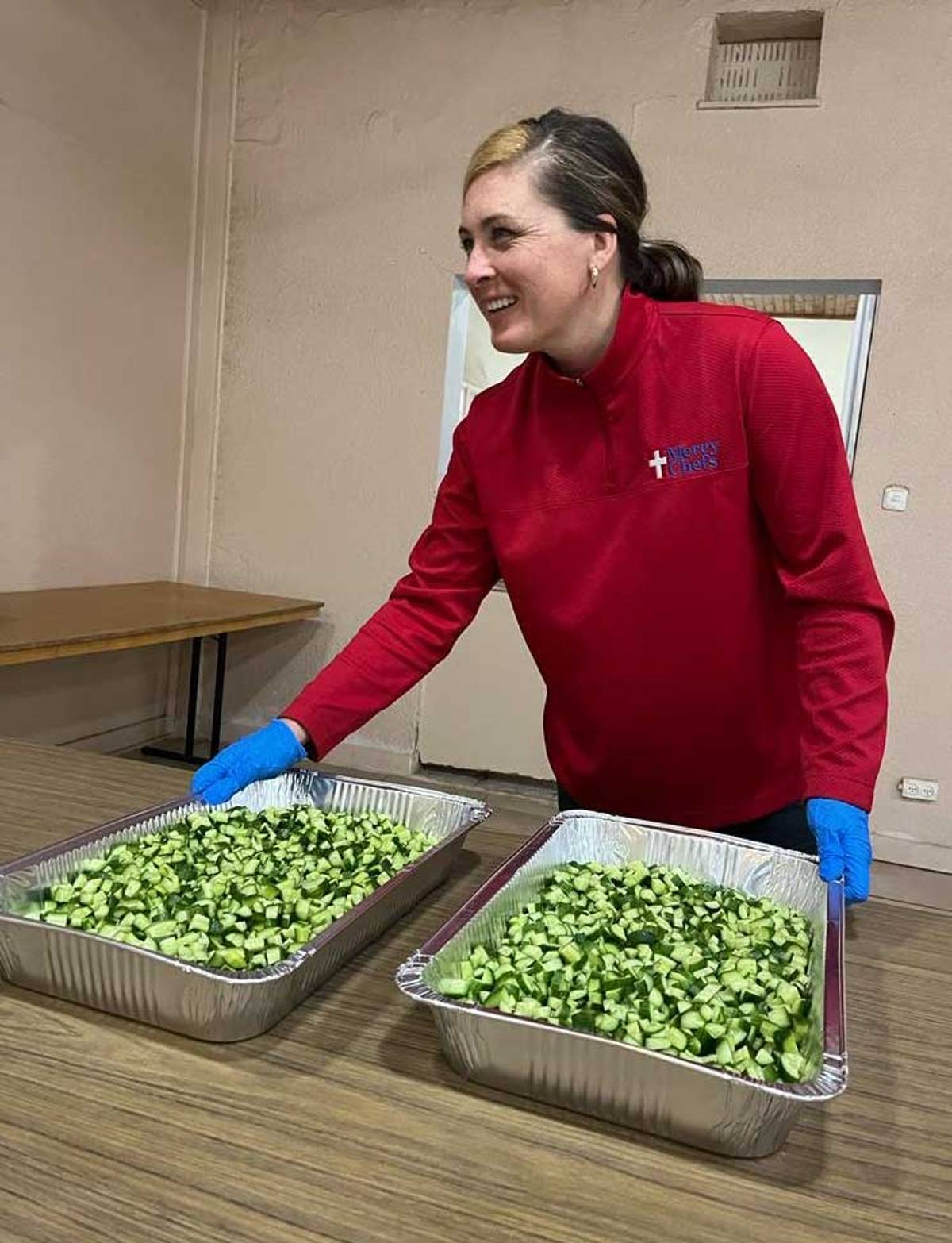Bridging Divisions During Wartime
In Israeli restaurants, people are coming together across religious and political lines

Courtesy the author

Courtesy the author

Courtesy the author
Three Israel Defense Forces officers who’d just been shifted from the southern coast to the north stopped in Haifa last Monday for lunch at Hummus Abu Shaker. They were drawn by the restaurant’s having made a name for itself—beyond its legendary food.
Abu Shaker did so by preparing thousands of meals to send to people affected by Hamas’ Oct. 7 massacre of Jewish communities near the Gaza Strip: survivors, IDF soldiers, paramedics, and police officers. The restaurant also publicly expressed solidarity with the victimized families and with Israel.
The weekend after an anonymous poster, writing in Arabic on Facebook, called for a boycott of the eatery—saying the Muslim family that owns the restaurant was betraying the Arabs by sympathizing with and helping Israelis—Abu Shaker filled with diners, most of them Jewish, who came out to support the owners.
Abu Shaker’s stance and its clients’ response are dramatic examples of Israelis’ long-spoken maxim that, for all of the country’s fissures—political, cultural, and religious—people unite during crises, particularly against external threats. Other similar examples abound of Israelis putting aside long-standing differences in this time of war; many of those examples center around food.
For instance, several Jewish-owned, nonkosher food establishments have sought and earned short-term kashrut certification during the past month, to enable soldiers and civilians who observe Jewish dietary rules to eat their food.
“What’s important is that they made the effort and were ready to donate their time and money to be kosher to provide food for the soldiers,” Yehuda Ziderman—who oversees one certifying agency, Kashrut Tzohar—said of the several restaurants and catering halls that contacted him. (One kibbutz known for its production of pork inquired about gaining short-term kashrut certification, too, but nothing came of the initiative.)
One restaurant that had remained open on the fast day of Tisha B’Av this summer—to express its opposition to religious coercion pushing secular restaurants to close on religious holidays—contacted Ziderman three months later to ask how to qualify for kashrut certification. The organization will issue temporary certification in one-month increments. “It’s unreal, fantastic,” he said. “We’re not looking to turn them into observant Jews. They just wanted to provide food to soldiers.”
Yossi Klein Halevi, a senior fellow at Jerusalem’s Shalom Hartman Institute, thinks that some of the most serious tears in the country’s social fabric, at least among Jewish Israelis, were mending before the judicial-reform controversy ripped them anew. “It’s not necessarily that we’re putting aside our disagreements” during wartime, he said. “It’s that the extent of our disagreements were distorted by the government” in its support for the reform measures. “We’re in the process now of restoring the balance to Israeli society.”
Nonobservant Israelis’ support for soldiers, including observant ones, is hardly a new phenomenon, and gestures like preparing kosher food for them is to be expected, Klein Halevi said: “When secular Israelis don’t feel that they’re being coerced or that religion is being shoved down their throats, they want to show respect and even love for tradition.”
Hila Yeshayahu was raised in a traditional household and is the manager of The Pot Whisperer, a take-out catering business near Petach Tikvah that her twin sister owns. It doesn’t have a kashrut certification, which is OK with most of the customers, whom she described as traditional Jews who don’t look for a hekhsher. The patrons are satisfied that the food contains only kosher ingredients and that dairy is not used at the meat-only establishment.
When the war began and a nearby army base wished to order meals, Yeshayahu and her sister decided to pursue a kashrut certificate to enable everyone to eat. For The Pot Whisperer, that involved minor modifications, like transforming one of the two main ovens to be pareve (used for neither dairy nor meat foods) so that bread and desserts baked there could be eaten anytime, carefully inspecting rice and parsley to ensure they didn’t have bugs (insects are not kosher, even when consumed inadvertently), and ritually burning a portion of dough used for baking on a large scale.
The company earned temporary kashrut certification and at its peak prepared 1,000 meals daily for soldiers, people evacuated from the south, and families visiting loved ones hospitalized due to the attacks. Everything was covered by donations from Israelis and foreigners, she said. Until reopening Nov. 1 without the certificate, it went three weeks without revenue.
“We wanted to help in this war, to do a small part. We didn’t want to send 100 meals [to a military unit] and 20 wouldn’t be able to eat,” Yeshayahu said. “I feel on top of the world. It gladdens me to be a part of this effort. It’s a sense of giving and doing. It was a big honor.”
Kashrut certification, she added, “was a barrier, we found a way to lower it, and we were happy to do so. ... I think that’s what war has done—unites us.”
Heather Quinones is based now just a few miles from Yeshayahu, but without a background in kosher food—or in Judaism at all. She works for Mercy Chefs, a Christian charity that prepares meals for populations in need, such as following earthquakes and floods. She and her husband had sold their California home and drove cross-country to her new job in Virginia. In South Carolina, they learned of the Oct. 7 massacre and flew to Israel.
The Quinoneses are based at the Baptist Village, a retreat center in Petach Tikvah better known as the site of one of Israel’s few baseball fields. It has an industrial-equipped kitchen, so Mercy Chefs set up shop there with a staff of four. It is a nonprofit organization based on Christian teachings, but has no religious agenda wherever it helps—“no conversion, no preaching, just giving hot meals with love,” Quinones said. “We want to offer our heart on a plate.”
The fact that she’s a Muslim and I’m a Jew makes no difference. She’s a person; I’m a person—plus, this is the best hummus in the country.
Going kosher, as Mercy Chefs did, aligns with the organization’s imperative to prepare food that members of the host culture enjoy, she explained. This is the first time in the 200 deployments since its founding following Hurricane Katrina in 2005 that the organization prepared kosher food.
“If the local authority for food preparation is Jewish … and comes under Jewish law, that’s what we’re going to seek out, because that’s the highest standard here,” she said. “We want to [work] alongside people who are serving their community. [That] creates a camaraderie to help others.”
Any cross-cultural bridge-building resulting from her work, Quinones said, is incidental. Preparing good food is the aim—and on Nov. 5, the day we spoke, Mercy Chefs served its 30,000th meal in Israel.
“As much as people are able to come together,” she said, “that is a good thing.”
Nearly all of the outdoor seats at Hummus Abu Shaker were occupied at midafternoon last Monday. It gladdened Ibtissam Anbtawe, the eatery’s owner, whose father founded Abu Shaker in 1936. Anbtawe, 73, radiated joy. She patted the backs of some sitting diners and hugged those who stood, especially soldiers.
“They’re like my kids. All of them,” she said, gesturing to the three officers in uniform who sat just outside the entrance.
Anbtawe, who’s better known as Nadia, even has a grandson now serving in the IDF. He is Jewish—his mother was married to Anbtawe’s son and the restaurant’s manager, Osama—and lives in Ashdod, close to Gaza.
She clasped her hands before her face, gesticulating as she prayed that he remains out of harm’s way.

Courtesy Heather Quinones
Thirty minutes earlier, Anbtawe had embraced Avi Faigenbaum, a business consultant from Hadera, who was dining on hummus, french fries, and beer with his cousin Rami Sonnenschein, a retired policeman who lives on Kibbutz Gesher Haziv. Both are steady patrons. In the mid-2000s, Faigenbaum arranged a loan for Anbtawe to expand the business.
“The fact that she’s a Muslim and I’m a Jew makes no difference,” Faigenbaum said after she went back inside. “She’s a person; I’m a person—plus, this is the best hummus in the country.”
“In war, we’re all together,” he said. “After the war ends, the old divisions will return. I hope not.”
The restaurant is still recovering from its revenue slide due to the boycott. The business had helped the IDF and society at large before, but did so quietly. This time, it went public. That’s how important defeating Hamas is, Osama Anbtawe said.
He regrets nothing. The proof, he said, is that supporting the Jewish state begat Jews’ support for his eatery—and Jews already accounted for 70% of his clientele. Some Arab patrons have whispered their support for Anbtawe. A local butcher, a shawarma-restaurant owner, and a baker—all Arab—are contributing meals to soldiers and to suffering families, he said. (Abu Shaker and the three other businesses are not kosher.)
“I gave a push, a precedent, to others,” Anbtawe said.
Jews in France, Germany, Morocco, and the United States called and texted their support. Jewish patrons have driven in from across Israel. Someone who keeps kosher purchased a container of hummus, perhaps to give it to a non-Jewish friend, Anbtawe said.
“I didn’t know that Israelis have such a big heart,” Anbtawe said. “This gives us the feeling that not only did we do something good, but that someone who does something good gets good.” He added: “Whoever supports Hamas shouldn’t eat here.”
Living throughout his life in the multicultural city of Haifa, Anbtawe said, he has always felt connected to Israel and the Jewish people. He called Jews “habnei dodim shelanu,” our cousins. It’s a term Jewish Israelis sometimes use, not always positively, to refer to Arabs. Anbtawe used it positively.
“We’re one nation. Ein lanu eretz acheret,” he said, meaning: “We have no other country,” which is what Israeli Jews often say to mean that Israel is the final refuge. The words appear on billboards throughout the country these days to project the consensus that defeating Hamas is an existential challenge.
He spoke again about Nadia. She has a soft spot for soldiers, especially those from other countries whose loved ones live far away, he said.
Soldiers call her “Mom,” Anbtawe said. “She loves soldiers. How can she not help at a time of war, when Hamas is killing us and burning us?”
Hillel Kuttler, a writer and editor, can be reached at [email protected].